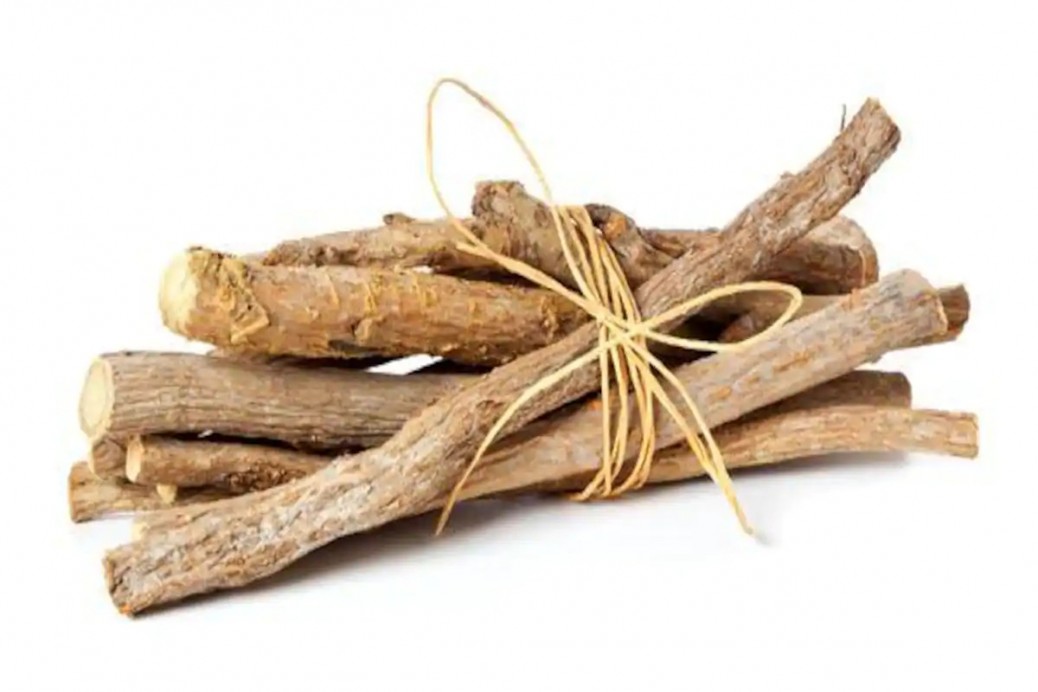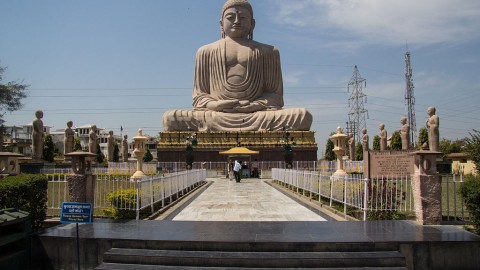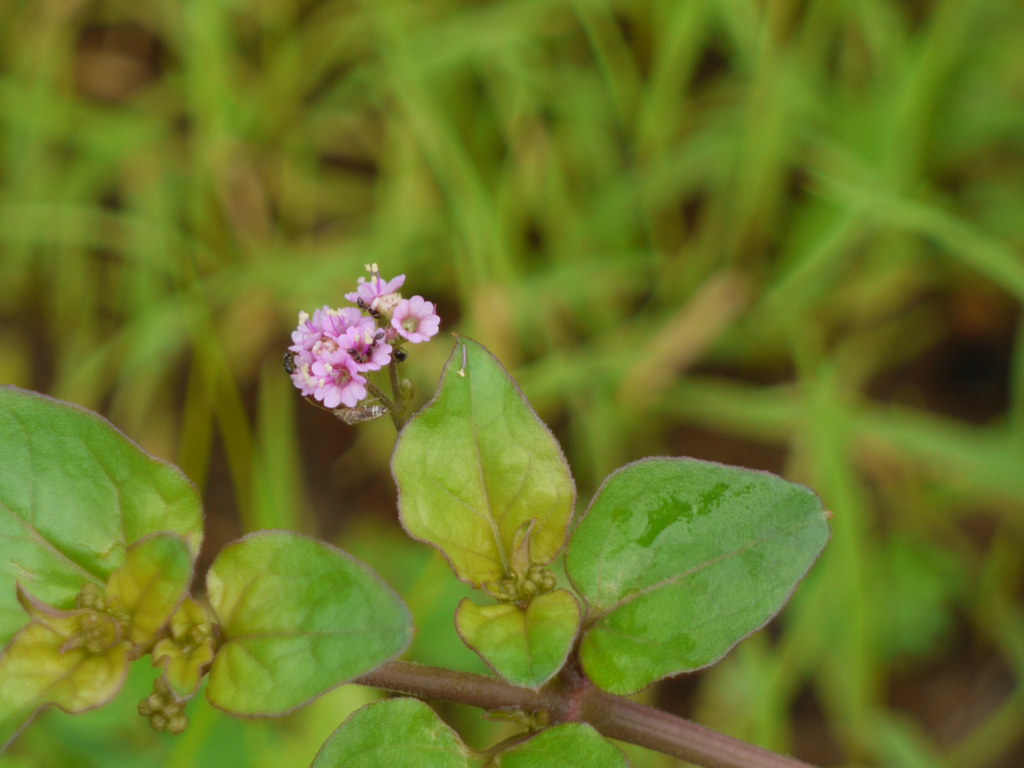Yashtimadhu has Latin name Glycyrrhiza glabra. It is commonly called as Liquorice or mulethi. Yashtimadhu powder is prepared from the best quality of this herb. To heal the ailments this herb has the great medicinal importance in Ayurveda. This herb possesses the immune modulator, anti-bacterial, anti-asthmatic, antacid, anti ulcerogenic, anti-inflammatory, anti-oxidants, analgesic, anti-Alzheimer, anti-cancer, anti-arthritic and aphrodisiac properties. It has a calming effect on the throat and pharynx hence its use is quite good for hoarseness of voice. Bioactive compounds present in the root of this herb are glucose 3.8%, 3.6% glycyrrhizin which is a yellow amorphous powder-asparagine, a glycoside isoliquirtin,starch, gum, mucilage, amorphous, sulphuric acid and metallic acids, calcium and magnesium salts.
Phytochemistry (Chemical Composition)
Mulethi (Yashtimadhu) contains a sweet substance and a saponin glycoside, glycyrrhizin (also known as glycyrrhizic acid). It is 30 to 50 times sweeter than sugar and the taste of sweetness in the mouth lasts longer than sugar. On hydrolysis, glycoside converts into aglycone glycyrrhetinic acid and loses its sweetness. Yellow color of liquorice is due to Chalcone Glycoside Isoliquiritin.
Mulethi (Yashtimadhu) Benefits & Medicinal Uses
The main beneficial effects of Mulethi (Yashtimadhu) are on the digestive system and respiratory system. It helps in relieving gastric symptoms such as heartburn, burning sensation in the abdomen, peptic and duodenal ulcer, abdominal colic, GERD and chronic gastritis.
Mulethi contains Glycyrrhizin, which is sweet in taste and reduces inflammation of gastrointestinal tract. It benefits in following diseases related to the digestive system.
Hyperacidity and Gastritis
Mulethi acts as an antacid and reduces free and total HCL levels in the stomach. It decreases acidic irritation to peptic mucosa. It is effective in acute as well as chronic gastritis.
In Indian Medicine, Mulethi (Yashtimadhu) is used with amla powder (Indian Gooseberry), coriander seed powder, giloy and nut grass powder for relieving gastritis and hyperacidity.
Stomach ulcers
Mulethi has anti-inflammatory effects and anti-ulcer properties. It decreases the inflammation of stomach linings. Various studies have shown its significant anti-ulcer and anti-inflammatory properties.
It has protective effects against stomach ulcers. It reduces the chances of gastric ulceration induced by aspirin and other NSAIDs (Analgesics)
In duodenal ulcer, deglycyrrhizinated licorice (Yashtimadhu) has ulcer healing properties. It corrects the gastric mucosa and reduces ulcerations.
Helicobacter pylori infection induced peptic ulcer
Mulethi extract has some flavonoids, which act as Anti-Helicobacter pylori. The flavonoids such as glabridin and glabrene found in Yashtimadhu have inhibitory effects against H. pylori. Therefore, Yashtimadhu can be used against H. pylori infection and peptic ulcer caused due to H. pylori.
Aphthous ulcers or Mouth ulcers or Canker sores
Mulethi can provide 50 to 75% relief from Aphthous ulcers within one day and complete remission of ulcers within three days.
Canker sores are a common type of mouth ulcers characterized by pain and tenderness. These are white or yellow in appearance surrounded by red area. Yashtimadhu water or tea reduces the pain and tenderness. Its gargle is also effective in reducing the size of canker sores.
Ulcerative colitis
Mulethi contains a Glabridin compound, which reduces colonic inflammation. It can speed up the healing process in inflamed mucosa and prevent ulceration of mucosa of the intestines.
In Ayurveda, It is used with Indian gooseberry, Bamboo Manna (vanshlochan) and Giloy satva for ulcerative colitis treatment.
Nonalcoholic fatty liver disease
Mulethi can help in nonalcoholic fatty liver disease. It reduces elevated liver enzymes.
According to Ayurveda, yashtimadhu is not a potent remedy for liver diseases, but it can help in this condition when taken with other hepatic protective herbs such as Punarnava, Bhringraj, Giloy, Patha etc.
Use of Mulethi in Cough
Mulethi is therapeutically helpful in sore throat, throat irritation, cough and bronchitis.
Yashtimadhu has expectorant properties. It also eases in coughing up the thick yellow sputum accumulated in the lungs. Due to antibacterial properties, it also reduces infection of the upper respiratory tract. It reduces throat irritation and helps in chronic cough.
Bronchitis & Asthma
Mulethi attenuates the inflammation of bronchi and soothes the respiratory tract, thus it helps in bronchitis. Due to anti-inflammatory effects, it is effective in many inflammatory diseases including bronchitis and arthritis. It can also be beneficial in allergic asthma, according to studies.
In asthma, it can be used with Pushkarmool powder and honey.
High cholesterol
Mulethi has potency to reduce serum cholesterol levels and hepatic cholesterol. The possible action of Yashtimadhu might be associated with conversion of cholesterol into the bile.
Atherosclerosis
Mulethi root or mulethi has anti-atherosclerotic characteristics. The effects can be due to reduction of serum cholesterol and plaque formation in the blood vessels. Another antioxidant property can also potentiate its effects in preventing cardiovascular diseases.
Hormones
Mulethi is known for its effects on adrenal gland. It improves the adrenal gland functions. It can be helpful in people who take steroid drugs, because steroids suppress important adrenal gland functions and result in adrenal insufficiency. It assists the adrenal gland to recover its natural functions and stimulates adrenal hormones.
Malaria
Chinese licorice roots contain a compound named as LICOCHALCONE. It inhibits the falciparum strain and its effects are similar to chloroquine. The studies have concluded that a new isolated licorice compound has potent antimalarial properties.
Tuberculosis
LICOCHALCONE found in Chinese licorice roots has inhibitory effects against myco-bacterial species. However, further studies are required to investigate the results of licorice in tuberculosis, although it can help in bacterial lung infections.
Sore throat
Gargling with yashtimadhu water or decoction reduces throat inflammation, irritation and pain. The studies have shown that yashtimadhu gargle reduces incidence of sore throat by 50% in post-extubation coughing and attenuates postoperative sore throat.
In Ayurveda, mulethi root powder is used in sore throat with honey and sitopaladi churna.
High potassium levels
Some research studies conclude that there are certain compounds found in mulethi, that decrease potassium levels in the blood. Hence, it might be effective in cases of high serum potassium in people with kidney diseases and diabetes.
The main warning is that it should not be used in cases with low potassium levels and high sodium levels. Otherwise, it may result in severe myopathy due to hypokalemia.
Eczema
Mulethi paste, oil or gel application helps in eczema as well as inflamed and itchy skin. Some herbal creams and gel used for eczema treatment contain licorice extract. It reduces itchiness, redness and swelling.
Hair fall & premature graying of hairs
In Ayurveda, Mulethi is used for preventing hair fall. It is useful orally as well as in herbal shampoos. According to Ayurveda, vitiation in PITTA and VATA humor results in hair fall and premature graying of hairs. Mulethi has effects on both these humors and helps in pacification of these aggravated humor’s activities in the body.
Blemishes and dark spots
Generally, blemishes and dark spots are found in PITTA type people or in PITTA aggravation. Mulethi with Indian gooseberry shows promising results in decreasing blemishes and dark spots. According to our experience, it can take up to 3 to 6 months for complete fading of blemishes and dark spots. However, this herbal combination is more effective in blemishes than dark spots.
Muscle cramps
Mulethi has antispasmodic and muscle relaxant characteristics. It reduces muscle cramps and tenderness in patients with fibromyalgia.
Its effects have been mainly noticed in abdominal spasms that occur during menstruation in women, but it cannot be so potent that it can work alone, so patients may require other medications too.
It can also help prevent muscle cramps in patients on hemodialysis.
Osteoarthritis
In ayurvedic medicine, Mulethi is used with Ashwagandha for the treatment of osteoarthritis. Many ayurvedic analgesic preparations contain yashtimadhu and ashwagandha as main ingredients.
Chronic fatigue syndrome (CFS)
Mulethi can help patients with chronic fatigue syndrome. This action might be due to strengthening and antioxidant activities.
Menopausal Hot Flashes
Studies suggest that Mulethi can decrease the severity and frequency of hot flashes during menopause. It is also well acceptable and tolerable in most of the women.
In Ayurveda, Yashtimadhu is used for reducing menopausal symptoms along with SARASWATARISHTA and MUKTA PISHTI.
Oligospermia
Mulethi has a cooling effect on the body, according to Ayurveda. It also has great strengthening and rejuvenation effects. It is used with other herbs to boost spermatogenesis and quality of sperm.
Seminal Weakness
However, Mulethi is not recommended in people with loss of libido, but it can help in men suffering with early discharge or seminal weakness . Generally, hyper-excitement or hypersensitivity is a cause of early discharge in men. It reduces excessive excitement and thus helps in treating early discharge problems in men. Sometimes, the mind plays a role in early discharge in which yashtimadhu is also effective.
Prostate hypertrophy or cancer
Mulethi is also used in prostate hypertrophy and prostate cancer, but its relevant studies are not yet available on this subject.
Abdominal fat
Mulethi contains some flavonoids, which reduce abdominal fat accumulation. The research suggests that it also has hypoglycemic effects, so mulethi can benefit in diabetes too.
It can also help obese people with elevated serum cholesterol levels. We have already discussed the effects of yashtimadhu on cholesterol in the heart health section above.
Tags: Ayurveda Yashtimadhu








